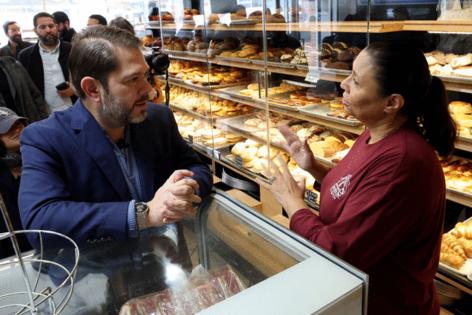US Sen. Ruben Gallego, a Chicago native, denounces immigration raids in return home
Published in News & Features
CHICAGO — U.S. Sen. Ruben Gallego walked down 26th Street in Chicago's Little Village neighborhood on Friday morning while moments from his past came back to life. This is where he came every year to buy shoes for school. Across the street was the shop where he rented a tuxedo for prom.
There weren’t many restaurants around that didn’t look familiar. Gallego, 46, the junior senator from Arizona, walked into one he and his family used to frequent for dinner — where he and his sisters used to sneak in, underage, to go dancing.
“My family would come down here for everything,” Gallego said. He had returned home, close to where he grew up, not to relive “very, very fond memories,” as he described them, but to take stock of one of his most beloved places in the aftermath of President Donald Trump’s Operation Midway Blitz.
Gallego said he wanted to see everything for himself. He felt a responsibility to see it, given his membership on the Senate’s Committee on Homeland Security and Governmental Affairs. He acknowledges there’s not much a Democrat in a Republican-controlled Senate can do to shield the Chicago area from Trump’s immigration crackdown, but the city, in many ways, is still home and he wanted to be here.
And so he walked through the heart of La Villita, stopping to talk with locals at a mom and pop grocery store and a Quinceañera shop and a restaurant and a bakery with a menu written by hand.
For months, he followed the immigration raids in Chicago and watched footage — from Little Village and places in and around the city — that reminded him of serving with the Marines in Iraq. He said he heard discomforting accounts of everything happening in Chicago from relatives and friends who still live here. The videos he saw angered him, he said.
“I fought in urban combat and the tactics they were using in Little Village, a place that I went to as a young man,” Gallego said, pausing. “They were treating it like a war zone. These men were dressed in battle fatigues with like, automatic weapons in an area that just doesn’t need it, right?
“And to Americans in an American (city), it was disgusting to me.”
During a brief news conference in the back of Carnitas Uruapan, where the owner had prepared a plate of chicharrones as a welcome gesture, Gallego denounced the tactics that order U.S. Border Patrol Cmdr. Gregory Bovino and his Border Patrol agents employed throughout Chicago. Perhaps no neighborhood was more of a target to Bovino than Little Village, one of Chicago’s proudest Latino communities.
The neighborhood became an epicenter of the tension prevalent throughout Chicago during the raids. In Little Village, protesters often clashed with agents, who responded with force and tear gas. The whistle campaign that spread throughout the city began there. The community felt threatened, constantly, and Gallego said he could still feel residents’ stress on Friday.
“Fear,” he said, when asked what most stood out from conversations he’d shared with locals during his visit. “Their own government came and brought fear onto them. They felt attacked by their own government. You know, I was talking with the woman at the bakery, and she was born in this country, and she had kids in this country.
“And her kid ended up having to go to therapy because he felt that he was potentially threatened. And he was born in this country. ... And I think that’s the most shocking thing, that the American government is causing fear to their own citizens.”
Gallego’s tour Friday began inside a grocery store, La Chiquita, where he spoke with workers about the raids. Irene Linares, whose family founded the store, relayed stories of locked doors and children shopping for parents too afraid to leave home. Gallego asked about her customers.
“They’re scared,” she told him.
Gallego is the son of immigrants, his mother from Colombia and his father from Mexico. He grew up on the South Side, in Pilsen and Back of the Yards and Gage Park before his mom moved him and his siblings to suburban Evergreen Park when he was in seventh grade.
He ascended from a humble apartment there to Harvard, the Marines and the U.S. House of Representatives before winning a contentious Senate race last year, doing so in a state Trump won by 5.5%. Gallego’s visit to Chicago, like one to Pennsylvania in May, has fueled speculation that he might have interest in entering the 2028 presidential election.
He dismissed that talk Friday, though, while offering a reminder that “Illinois is not a swing state,” and thus not one where he’d need to build support. He had come back, he said, because he wanted to introduce his newborn son to family and because he wanted to better understand what had happened in Little Village throughout the past several months.
Bovino and his agents were gone, for now, but their presence is still felt. The signs warning of ICE and Border Patrol still hang in windows of businesses and restaurants. Gallego had come to bear witness, meet local leaders and speak out. At a “minimum,” he said, “you should not be racial profiling Latinos anywhere in this country.”
“No. 2 , they need to conduct themselves — ICE, Border Patrol — like professionals. The way they treat people here, I wouldn’t even treat insurgents in Iraq. That they’re treating Americans here in this country that way is ridiculous.”
Outside, 26th Street was slowly starting to come back to life. The agents were gone “but they will be back,” Gallego said. At Carnitas Uruapan, workers prepared for lunch as Gallego’s visit ended. There was no shortage of open tables, and hope that business might pick up.
_____
©2025 Chicago Tribune. Visit chicagotribune.com. Distributed by Tribune Content Agency, LLC.







Comments